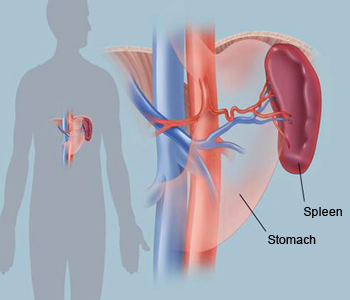 Spleen
The spleen has two main functions. It maintains blood quality and plays an important part in immune system function. The spleen maintains blood quality by cleaning toxins out of the blood, recycling and conditioning red blood cells and helps blood components and minerals to stay in proper suspension
Spleen
The spleen has two main functions. It maintains blood quality and plays an important part in immune system function. The spleen maintains blood quality by cleaning toxins out of the blood, recycling and conditioning red blood cells and helps blood components and minerals to stay in proper suspension
Secondary or peripheral lymphoid organs maintain mature naive lymphocytes and initiate an adaptive immune response.
The peripheral lymphoid organs are the sites of lymphocyte activation by antigen. Activation leads to clonal expansion and affinity maturation. Mature lymphocytes recirculate between the blood and the peripheral lymphoid organs until they encounter their specific antigen.
Secondary lymphoid tissue provides the environment for the foreign or altered native molecules (antigens) to interact with the lymphocytes. It is exemplified by the lymph nodes, and the lymphoid follicles in tonsils, Peyer's patches, spleen, adenoids, skin, etc. that are associated with the mucosa–associated lymphoid tissue (MALT).
The spleen filters blood in much the same way that lymph nodes filter lymph. Lymphocytes in the spleen react to pathogens in the blood and attempt to destroy them. Macrophages then engulf the damaged cells and cellular debris. The spleen, along with the liver, eradicates damaged and old erythrocytes from the blood circulation. The tonsils and adenoids work to filter out germs and produce antibodies that are used as ammunition against any invading germs. A main function of tonsils is to trap bacteria and viruses (germs) which we breathe in. Antibodies and immune cells in the tonsils help to kill germs and help to prevent throat and lung infections. Peyer's patches (located in the mucous membrane lining of the intestine.), skin, etc. that are associated with the mucosa–associated lymphoid tissue(MALT) are some of the examples of secondary lymphoid organs.